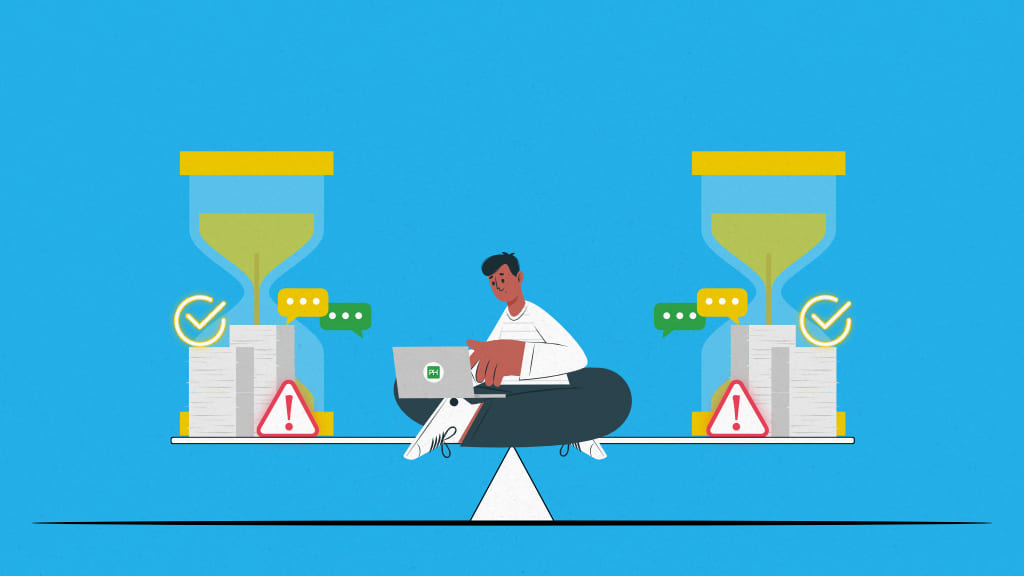Introduction
How to hold employees accountable?
Are you tired of dealing with the lack of accountability within your team?😫 Have you ever assigned jobs to your employees before, only to find out they do not take responsibility?😤
I know the feeling!
It can be extremely irritating, especially when target dates are looming and your goals depend on your employees’ performance. As a leader, I have realized that holding employees accountable is one of the most vital aspects of running a successful organization.
According to a Harvard Business Review, 82% of managers acknowledge they have “limited to no” ability to hold others accountable successfully. As a result, there may be a need for more productivity and responsibility, leading to decreased performance.
So what should you do if you still need to implement accountability measures? Without falling into the micromanagement trap (covering it below). 👇
Don’t stress out🫡! In this article, I will provide useful guidance on how to hold employees accountable and develop an environment where everyone takes responsibility for their job. In addition, I will also share practical accountability strategies, including valuable tips, appropriate tools, and technologies to help you establish a culture of responsibility.
So, let’s jump right in and discover the accountability techniques and tips for holding team members liable.👌
Why is it important to hold employees accountable?
Accountability in the workplace means that everyone takes responsibility for their activities, perspectives, how well they carry out, the results they attain, as well as the decisions they make.
When your team members are accountable, it creates a positive workplace where people are dedicated, motivated, and execute at their finest.
Importance of accountability:
👉 Promotes a culture of responsibility and ownership within the organization.
👉 Ensures that employees understand and meet performance expectations.
👉 Fosters a sense of fairness and equality among team members.
👉 Boosts productivity and efficiency by discouraging complacency and encouraging goal-oriented behavior.
👉 Helps identify areas for improvement and provides opportunities for growth and development.
👉 Maintains a high standard of quality and customer satisfaction.
👉 Enhances team cohesion and collaboration by establishing clear roles and responsibilities.
👉 Prevents misconduct and unethical behavior, ensuring adherence to company policies and values.
Now that you recognize the significance of employee accountability, let’s delve into the common challenges that many leaders encounter in this area.
How to hold employees accountable?
Now that you know just how crucial it is for managers to hold their employees accountable, allow me to share some actionable tips to ensure liability among their employees.👇
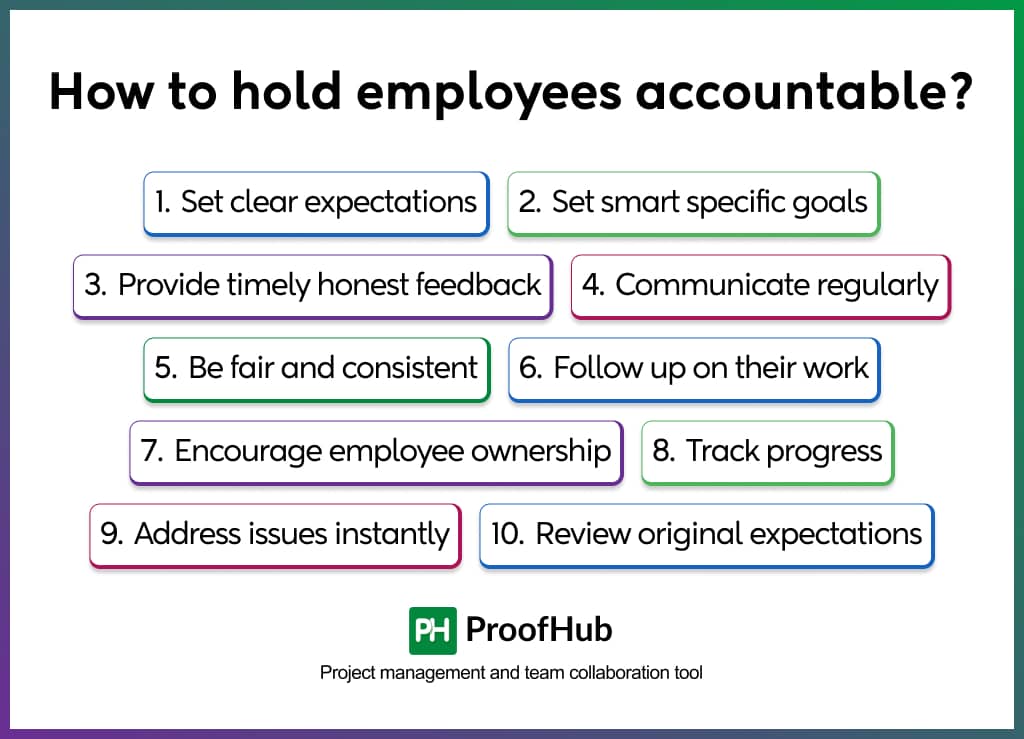
1. Set clear expectations💁
Having been a manager for more than a decade, I too have experienced these challenges firsthand. Therefore, I understand the importance of communicating goals and expectations clearly from the beginning, starting at the foundational level.
Additionally, creating a comprehensive task list that outlines start dates, deadlines, and the purpose of each task can further enhance clarity. This will enable your employees to have a better understanding of your expectations.
However, it is equally important to communicate that failing to meet expectations without a valid reason will not be accepted, promoting accountability and performance.
Explore these Best to-do list apps for better task management in 2026 to streamline workflow, boost efficiency, and stay ahead of the game.
2. Set smart specific goals🎯
Sometimes, goals are set in a way that’s too difficult for employees to achieve. Establishing goals that benefit both you and your staff members is important.
👉👉For example, it’s not practical to expect a new hire to increase sales multiple times in just one week. Rather, it’s better to break down the larger objectives right into smaller ones, which are more attainable. This makes the employee motivated and also allows you to analyze their performance successfully.
3. Provide timely honest feedback🧑🤝
“Feedback is the breakfast of champions.” – Ken Blanchard
When providing feedback to staff members, it is necessary to be particular, constructive, and prompt. Be clear regarding what they are doing well and identify locations where they can improve.
By offering regular feedback, you help them stay focused on meeting your expectations. Recognize their strengths to boost morale and motivation, while also addressing areas where they can grow. This ongoing feedback loop ensures that employees understand their progress, receive guidance for improvement, and ultimately contribute to the overall success of the team and organization.
4. Communicate regularly🗣️
Regular communication is essential for you to foster accountability among employees. It ensures clarity, progress monitoring, and feedback. Effective project management techniques, like setting goals and tracking progress, provide a structured framework for accountability.
Team collaboration tools also facilitate seamless communication, document sharing, and task tracking, promoting collaboration and accountability. These practices will help you create a culture of accountability, enhancing employee productivity and success.
5. Be fair and consistent⚖️
Being fair and consistent in holding employees accountable is essential for effective leadership. As a manager, I understand the importance of these principles and have personally experienced the benefits they bring.
I have created a culture of fairness and consistency in my team by establishing clear expectations and standards for all employees, regardless of their position or tenure. This approach helps me avoid favoritism or biases and ensures that accountability measures are consistently applied and enforced.
Additionally, providing regular feedback and conducting employee performance evaluations enables me to identify areas of improvement and further reinforce the culture of accountability within my team.
So, you can too follow these tips to foster a fair and consistent environment where everyone has an equal opportunity to succeed and grow.
6. Follow up on their work🏃
Being a manager involves more than just conducting meetings and expecting immediate results. It’s important to schedule follow-up dates to track progress and ensure timely completion of tasks. This can be done by setting up regular check-ins, either in person or through virtual platforms, where you discuss the status of ongoing projects, address any challenges, and provide necessary guidance. This approach encourages employees to start working promptly and enhances performance and efficiency.
However, it’s also crucial to strike a balance by avoiding excessive interference in their daily work, allowing them the freedom to think and act independently.
7. Encourage employee ownership🧑💼
Encouraging employee ownership means fostering a sense of personal investment in their work, which leads to increased motivation and performance. To accomplish this, provide opportunities for employees to add to decision-making, encourage autonomy in their tasks, and acknowledge their achievements.
By involving staff members in the decision-making process, providing freedom to work independently, and acknowledging their success, you cultivate a culture where they feel genuine ownership over their work, causing greater levels of employee engagement and also dedication.
8. Track progress📈
You can effectively track employee progress and set deadline reminders by implementing a few strategies. Firstly, establish clear and measurable goals, breaking them down into actionable tasks. Regular check-ins and progress updates provide opportunities to assess and address any challenges or roadblocks.
Additionally, utilizing tools like ProofHub can greatly assist in monitoring task progress. For instance, I have personally faced difficulties in checking task progress in the past, but ProofHub has helped me overcome this hurdle. With its various views such as the table view and board view, I can easily track the status of tasks and ensure their timely completion.
9. Address issues instantly🚄
Addressing issues instantly is crucial for promoting employee accountability. You can achieve this by actively listening to employee concerns, providing timely feedback, and addressing any performance issues promptly. By promptly addressing concerns or challenges, you demonstrate your commitment to resolving issues and supporting employee growth.
This approach helps employees feel valued, encourages open communication, and allows for course correction when needed. Additionally, providing constructive feedback and guidance promptly enables employees to make necessary improvements and align their actions with expectations. By addressing issues promptly, leaders create a culture of accountability and ensuring employee responsibility.
10. Review original expectations🧑💻
Leaders can effectively track employee progress and set deadline reminders by implementing a few accountability strategies. Firstly, they can establish clear and measurable goals, breaking them into actionable tasks. Regular check-ins and progress updates provide opportunities to assess and address any challenges or roadblocks.
Utilizing project management tools or software can streamline this process, enabling leaders to monitor individual and team progress, set reminders for upcoming deadlines, and ensure the timely completion of tasks. Additionally, open communication channels and supportive feedback help keep employees on track and motivated. By actively tracking progress and setting deadline reminders, leaders can foster accountability and ensure the timely completion of work.
Why do we struggle to hold employees accountable?
Why is it difficult to make sure employees are accountable for their activities? If accountability is crucial for success in a company, why do we struggle with it?
Below are some reasons why🤔:
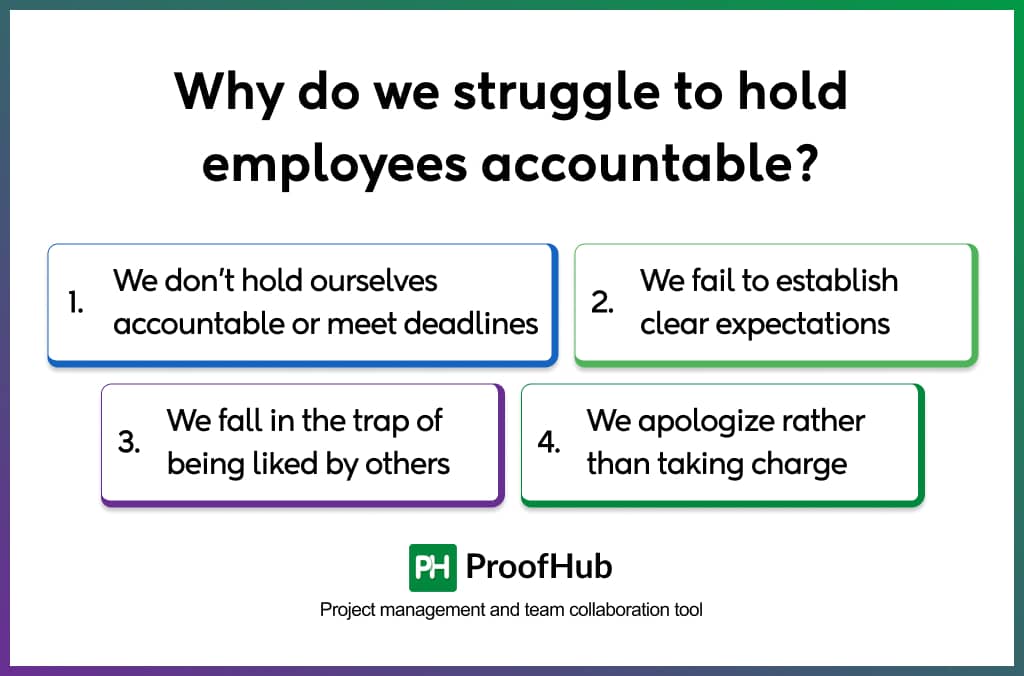
1. We don’t hold ourselves accountable or meet deadlines
You typically struggle with holding yourself accountable and meeting due dates, which can substantially impact your team’s performance.
Think of it: How can you anticipate others meeting their due dates when you are not setting a good example? It’s important to lead by example and demonstrate the same degree of commitment you want out of your team.
Additionally, inconsistency in holding individuals accountable can create confusion and a sense of unfairness. If you just occasionally exercise accountability, it becomes difficult to justify your actions and maintain a fair work environment.
2. We fail to establish clear expectations
Another main reason you may have difficulty holding employees accountable is that you haven’t established clear expectations. As a manager or leader, you must guarantee your staff members know what is expected of them. When tasks or assignments are unclear, it becomes challenging for workers to succeed.
Moreover, based on my experience as a manager for over a decade, I have personally faced these challenges as well.
It can be particularly difficult to enforce consequences effectively when employees are uncertain about the outcomes of their actions, such as being late to work. However, to promote accountability and cultivate an efficient work environment, it is imperative to communicate clear expectations and explicitly outline the potential consequences. By providing this clarity, employees will gain a better understanding of the significance of their actions and the influence they hold over the overall work environment.
3. We fall in the trap of being liked by others
We all want to be liked, but this can sometimes get in the way of holding others accountable. Fearing what others will say, you avoid confrontations or difficult discussions. Socially conscious managers who value harmony will find this to be especially important.
However, when you do not hold team members accountable, improving efficiency or addressing problems is almost impossible. It is essential to overcome your fear of conflict and understand that responsibility for others is crucial to management.
Prioritizing the success of your team or organization is more important than seeking approval constantly. You can then create an environment that is positive, productive, and conducive to growth and success for everyone.
4. We apologize rather than taking charge
Do you find yourself saying, “I apologize for bothering you, but do you have the record that you have to present at today’s meeting?”🙁
Consider it for a minute: You don’t need to apologize when checking on tasks to ensure they’re done on time. It’s not a burden for staff to keep track of deadlines or ensure quality work. It’s your basic role as a supervisor.
It depends on you to ensure that everyone in your team jumps on track and also satisfies the due dates. Be bold and track every person and also follow up. Your group depends on you for assistance and support to complete their objectives and also finish their job. You can create an environment of success and accountability in your team by staying on top of due dates.
By addressing these challenges and promoting a culture of liability, you can eliminate the struggle and produce an extra productive and accountable workplace.
Tips to improve employee accountability?
Recognizing the importance of accountability and how to hold your employees responsible, you’re currently on the right track. Now, enable me to assist you even more with these extra ideas to improve accountability and also correctly resolve the obstacles of micromanagement.
Below are some additional tips that may be helpful: 👏👏
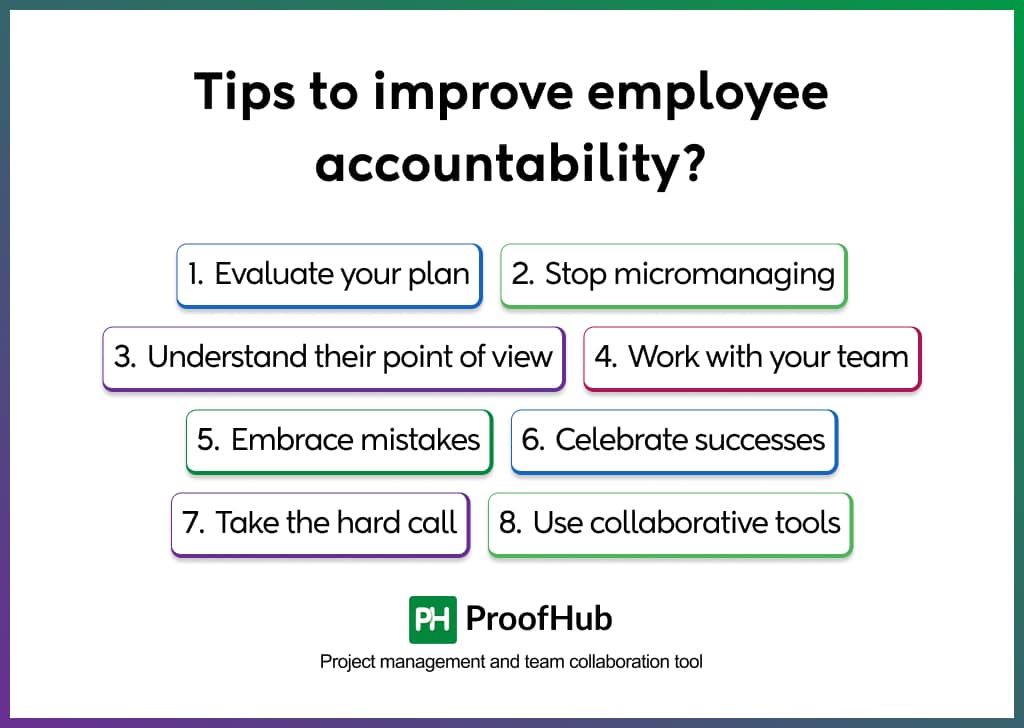
1. Evaluate your plan (hold yourself accountable)
As a leader, it’s vital to assess and own the impact of your strategies.
Imagine donning your detective hat, stepping back to scrutinize the results, and uncovering hidden gems of improvement.
This process is your key to perpetual growth and sharpened decision-making, ultimately paving the way for triumph.
Evaluating your plan showcases your unwavering commitment to goal attainment and nurtures a culture of accountability within your stellar team.
Tips for evaluating your plan
- Set clear performance metrics: Define measurable goals and KPIs to track progress accurately.
- Gather feedback: Seek input from team members, stakeholders, and experts for valuable insights.
- Analyze data: Dive into the data, identify trends, and make informed decisions.
- Reflect and iterate: Learn from outcomes, celebrate successes, and refine plans.
2. Stop micromanaging
In the pursuit of effective leadership, let go of the reins and stop micromanaging😵. Trust your team’s abilities and provide them with the freedom to thrive.
As Peter Drucker once said, “Management is doing things right; leadership is doing the right things.”
By focusing on the bigger picture and also equipping your team, you’ll cultivate a culture of development, boost morale, as well as unleash the complete capacity of your organization. Embrace delegation, and watch your team soar.
Tips to stop micromanaging?👇👇
✅ Physically withdraw from the group
Step away physically from the group to avoid unnecessary intervention.
✅ Control expectations instead of tasks
Set clear expectations and goals instead of controlling every task.
✅ Handle what you alone can handle
Prioritize tasks that require your unique expertise and delegate the rest.
✅ Inquire about management preferences among employees
Communicate with employees to understand their preferred management style.
✅ Pay attention to Managing Your Culture
Concentrate on shaping a positive work culture that fosters autonomy and growth.
✅ Believe in your team
Place trust in your team’s abilities and avoid excessive meddling.
3. Understand their point of view
As managers and leaders, empathizing with your team members’ thoughts, feelings, and concerns helps improve communication, trust, and effectiveness in decision-making.
By acknowledging their unique experiences, you create a supportive environment that enhances employee productivity and engagement.
Tips for understanding employees’ point of view
✅ Active Listening: Pay close attention to employees’ cues, allowing them to express thoughts fully. Show genuine interest and avoid interruptions.
✅ Empathy: Understand employees’ feelings and motivations, considering their challenges. Build trust and accountability in the workplace to address their needs effectively.
✅ Open Communication: Create a safe space for ideas and concerns. Seek regular feedback and engage in conversations for insights.
4. Work with your team
As managers and leaders, fostering a collaborative environment is essential for maximizing productivity and achieving success. By encouraging teamwork, you can tap into the collective strengths of your team, promote innovation, and overcome obstacles more effectively.
How to work with your team?🤔
✅ Engage actively with your team members to foster collaboration and participation.
✅ Understand the roles and responsibilities of each employee to ensure effective task allocation and coordination.
✅ Address and resolve the challenges faced by your team members to facilitate their success.
✅ Maintain open and consistent communication with your team to promote transparency, alignment, and understanding.
5. Embrace mistakes
“Success is not final, failure is not fatal: It is the courage to continue that count.” – Winston Churchill
Embrace Mistakes. Yep, you heard it right. Instead of fearing slip-ups, let’s see them as valuable learning experiences. When you create a safe space for the team to make mistakes, you cultivate innovation and growth.
So, let’s encourage risk-taking, celebrate those who think outside the box, and inspire everyone to view failures as stepping stones to success. Together you can unlock new possibilities and propel our teams forward!”
Tips that will help you embrace mistakes
✅ Hold fail-forward sessions to create a supportive environment for learning from failures and applying lessons.
✅ Build trust and psychological safety through empathy, approachability, and transparent communication, enabling employees to experiment without fear.
✅ Encourage calculated risks by empowering employees with resources and support, promoting experimentation with thorough research.
✅ Foster learning opportunities through training, mentorship, and feedback, promoting continuous improvement and employee growth.
6. Celebrate successes
Success is never a solo act; it’s a symphony of collective effort and dedication!
Another key aspect that has contributed to my positive outlook throughout my career is the practice of celebrating my team’s successes. Recognizing and acknowledging the efforts and accomplishments of your employees is crucial, as it not only validates their hard work but also significantly enhances morale, motivation, and team spirit. By genuinely valuing and honoring their achievements, you foster a sense of pride, commitment, and an enduring drive for continued excellence.
Meaningful way to celebrate your employee’s accomplishments
✅ Provide a handwritten note or card written by hand.
✅ A small conversation that doesn’t take up too much of their time.
✅ A department’s email.
✅ You can make an announcement in the meeting room or during break time.
✅ Private discussion to express gratitude(If they are introverted).
7. Take the hard call
You are a leader, and there will be times when things will not go as planned, and you must take a hard call.
These difficult calls are essential for the development and success of your team or company, even if they might be challenging or out of favor. Understand the responsibility, trust your instincts, and lead with conviction.
When faced with tough choices, you can adhere to these steps to navigate the process:
✅ Clearly articulate your position with honesty and clarity to effectively communicate tough decisions.
✅ Avoid delaying tough calls as it only intensifies the issue and increases operational risks.
✅ When dealing with an angry subordinate, allow space for cooling down, then calmly discuss the issue, provide context, and remove the focus from personal conflict to diffuse anger and maintain team alignment.
✅ Be blatantly honest with your people, as avoiding tough calls creates suspicion, disbelief, and subversive behavior, while honesty earns respect and fosters development.
✅ When firing someone, prioritize the organization’s interests, be respectful, and direct, and avoid personal statements by using “we” phrases to focus on organizational reasons for the decision.
8. Use collaborative tools
Leaders can utilize collaborative tools to boost employee accountability by offering features for setting goals, tracking progress, and sharing tasks.
These tools promote teamwork, streamline communication, and make accountability a shared and engaging experience, ultimately driving productivity and success.
With features like task management, time tracking, and file sharing, a project management tool enables leaders to assign tasks, monitor progress, and foster a sense of ownership among employees.
Moreover, these tools have user-friendly interfaces and interactive features that make accountability seamless and enjoyable, leading to increased productivity and successful outcomes. ProofHub, a powerful project management and team collaboration tool, encompasses all these necessary features that help you exercise these effective accountability practices.
Let’s explore more how ProofHub can help you.
How can ProofHub help?
Imagine a workplace: Where everyone is focused, tasks are streamlined, and accountability is a breeze. Well, ProofHub, a powerful project management and team collaboration tool, can make that a reality.
With its user-friendly interface and robust features, ProofHub empowers teams to collaborate seamlessly and hold employees accountable like never before. By utilizing ProofHub, you’ll create a virtual workspace that keeps everyone on the same page.
But how does ProofHub enhance accountability?
Well, it offers a variety of features designed to keep employees on track, which are:
1. Set clear expectations for each project – First things first, setting clear expectations for each project is crucial. With ProofHub, you can easily define project goals, establish milestones, and allocate tasks to team members. This ensures that everyone knows what is expected of them, eliminating any confusion or ambiguity. It’s like creating a roadmap that guides everyone towards success.
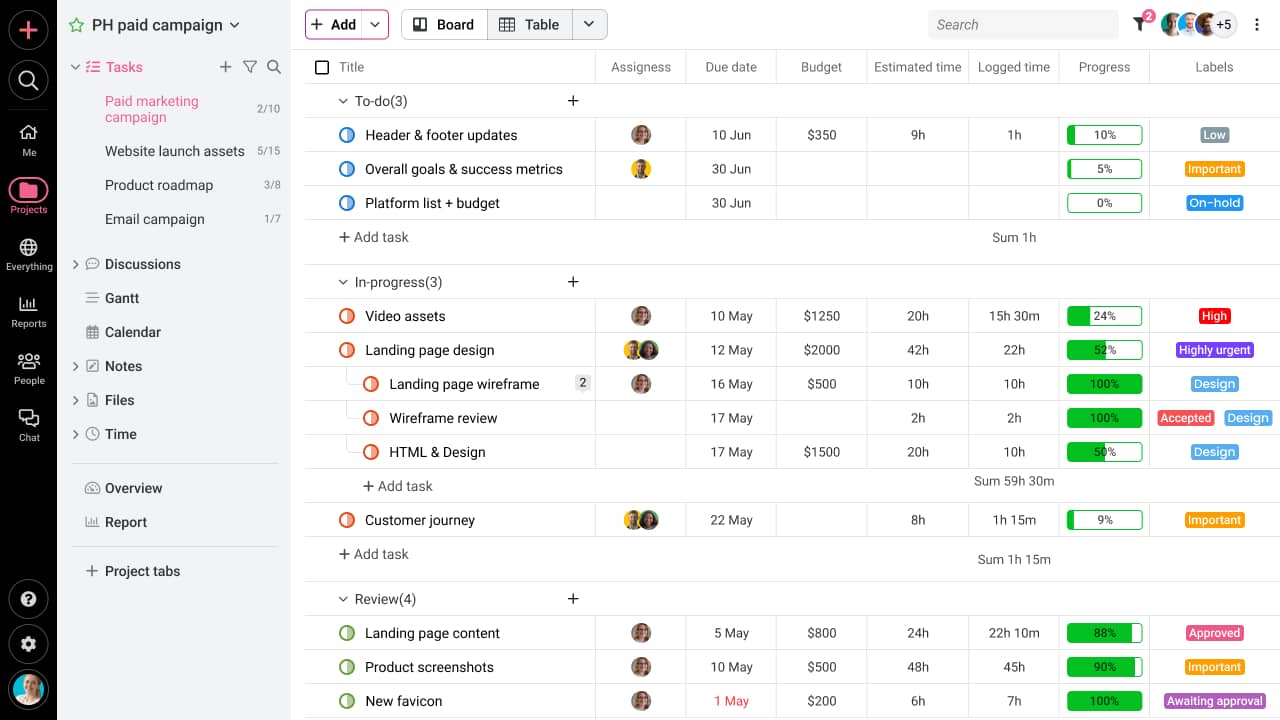
2. Track employee progress – Now, tracking employee progress becomes a breeze with ProofHub’s handy Gantt chart and task views. These visual tools allow you to see the overall project timeline and individual task statuses at a glance. You can rapidly evaluate that it’s on track, identify any kind of traffic jams, and also take necessary activities to keep points moving smoothly. It resembles having a bird’s eyesight of your group’s progress.
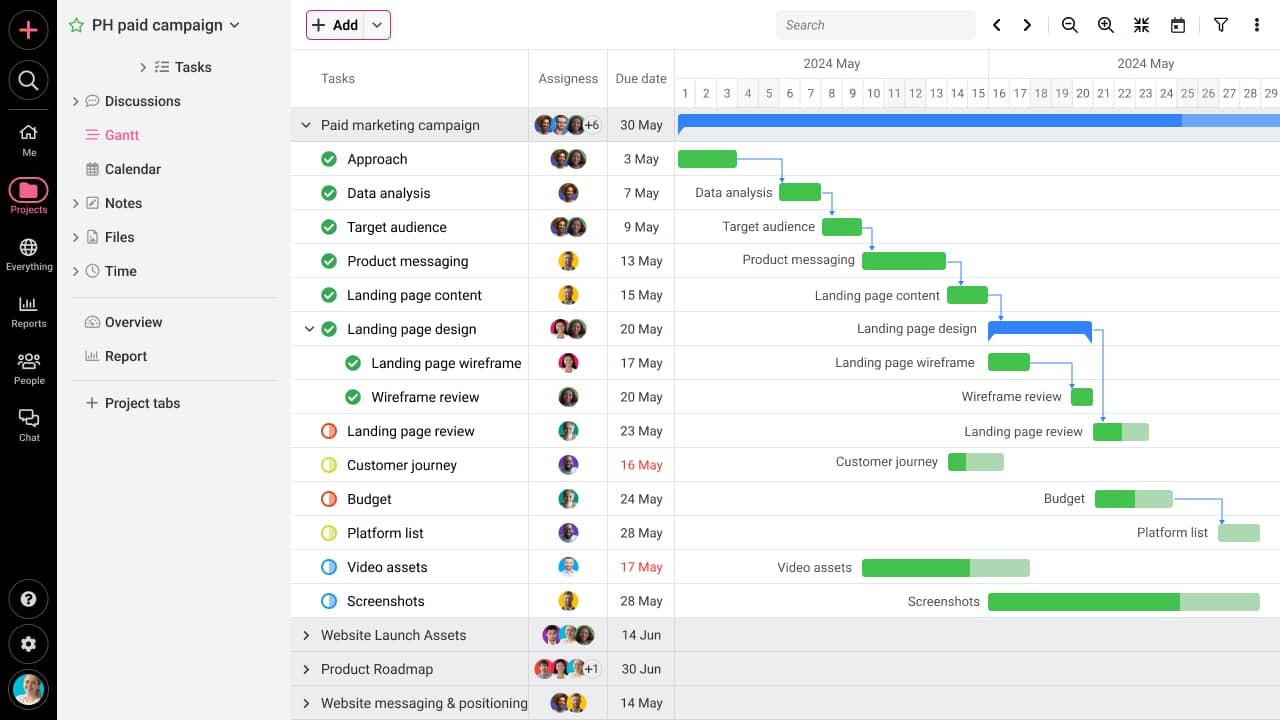
3. Provide regular feedback – But accountability doesn’t end there! Regular feedback is essential for growth and improvement. With ProofHub’s “@comments” feature, you can provide feedback directly on tasks, files, or discussions. This promotes open communication and ensures that feedback is targeted and specific. It’s like having a virtual feedback loop that keeps everyone engaged and accountable for their work.
4. Collaborating and communicating – This is my favorite: Collaborating and communicating effectively is another vital aspect of accountability. ProofHub offers shared calendars, discussions, and chats, enabling seamless collaboration among team members. You can schedule and track meetings, brainstorm concepts, and take part in purposeful discussions. This promotes a feeling of duty and also liability amongst staff members as they proactively add to the job’s success.
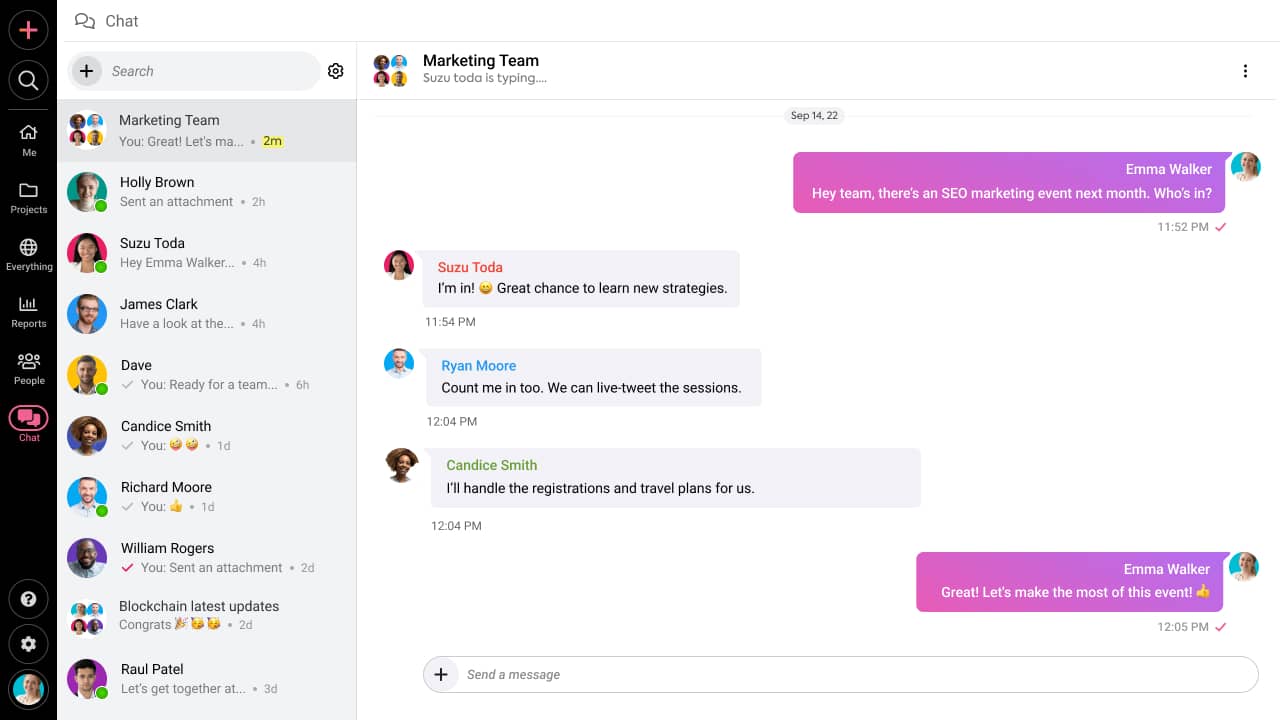
5. Reward good performance – Lastly, let’s not forget to reward good performance! With ProofHub’s announcement feature, you can publicly recognize and appreciate outstanding work. Celebrating achievements motivates individuals to maintain their high standards and encourages others to strive for excellence. It’s like giving a virtual pat on the back that reinforces a culture of accountability and recognition.
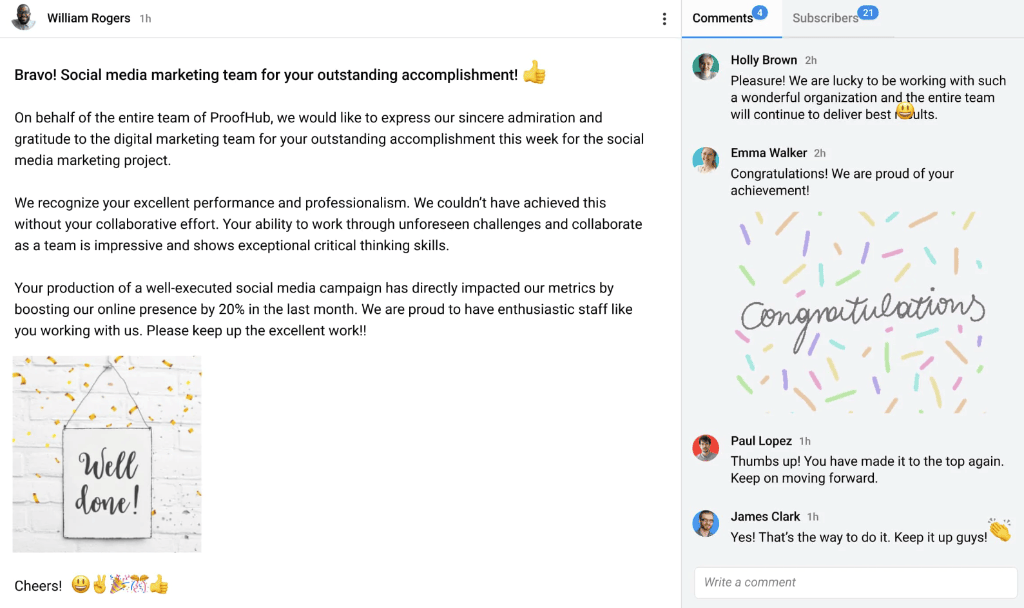
Streamline accountability with ProofHub: Taking action for success
Efficiently holding workers responsible is an essential aspect of management and organizational success. Leaders can promote a culture of responsibility and drive performance by establishing clear expectations, giving consistent feedback, and implementing consequences for non-compliance.
However, it is essential to recognize that implementing these strategies can be challenging for several leaders. Thankfully, tools like ProofHub offer comprehensive ways to improve liability procedures, enabling you to track progress, communicate expectations, and take swift action when needed.
With ProofHub’s assistance, you can overcome these challenges and create a more accountable and efficient work environment. Empower yourself with the right tools and take positive steps toward maximizing your team’s potential.
FAQs
What are the 4 key areas of accountability?
The four key areas of accountability are:
- People: Foster a culture of responsibility.
- Purpose: Align actions with organizational goals
- Performance: Measure and evaluate performance.
- Progression: Emphasize continuous learning and growth.
What are the 5 C's of accountability?
Common Purpose, Clear Expectations, Communication and Alignment, Coaching and Collaboration, and Consequences and Results.
How do you hold your team accountable without micromanaging?
Delegate tasks with clear expectations, provide routine feedback and assistance, develop a culture of open communication and trust, and equip employees to take ownership of their jobs.
How do you motivate a team to be accountable?
To encourage a team to be accountable, provide clear expectations, give them support and acknowledgment, foster open communication, motivate freedom, and link individual contributions to the team’s success.
Why is it important to hold employees accountable?
Holding workers accountable is important for promoting a liable society, driving efficiency, ensuring objective alignment, promoting growth, and accomplishing business success.
